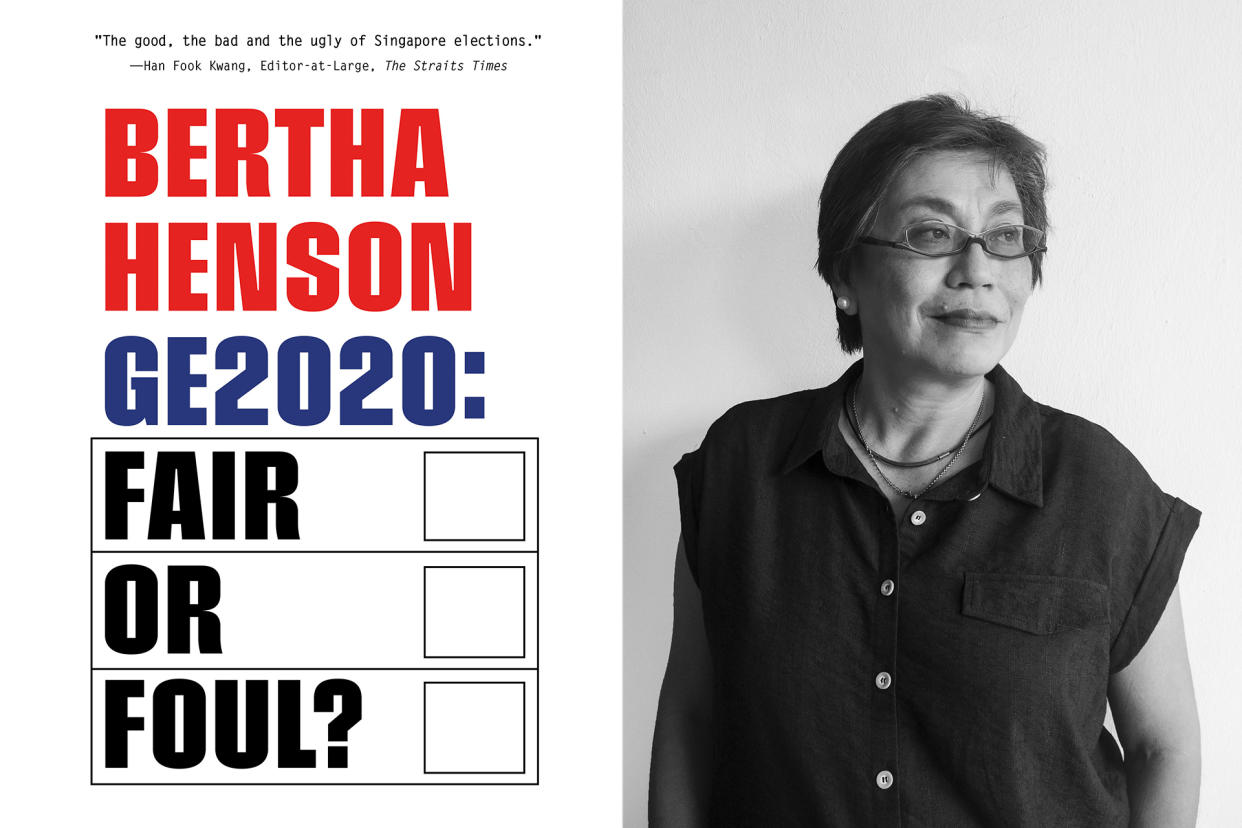On The Mic: Bertha Henson's new book probes Singapore's elections

LISTEN: Use the player above to hear our full interview with veteran journalist Bertha Henson
SINGAPORE — Veteran journalist Bertha Henson hopes Singapore’s younger generation of political leaders will take to heart the recommendations made in her new book, “GE2020: Fair Or Foul?”
“I’m trying to see if the rules can be made fairer not just for all political parties, but also to fit in with the aspirations of citizens for more political participation,” she said during an appearance on Yahoo News Singapore’s On The Mic podcast.
“I don’t think I’ve come across a book that looks at all aspects of the process, from the drawing of boundaries to grassroots work. In fact, I think most of them are academic works analysing voting results.
“I’m approaching from a layman’s perspective,” she added.
Asked if she had high hopes for the government paying heed to her advice, Henson said, “Whether they do or they don’t, I think the main thing is I’ve put it down. If somehow, somewhere someone picks it up and thinks it’s worth acting on, I would be very gratified.”
During the hour-long interview, Henson also spoke about the results of the recent general election, stating that she thinks the roughly 60-40 percentage split of votes in favour of the People’s Action Party is likely to be the “new norm”.
“Frankly, I think 60-40 is a very comfortable position for me as well because we do have the PAP government firmly in charge but (without) so strong a mandate as to make them so comfortable that they think they can do anything they want in Parliament,” said Henson.
She also noted that GE2020 has shown that Singapore has a “middle ground of swing voters who will have to be wooed assiduously”. “Bread and butter issues will still come first but increasingly, I think Singaporeans are imbued with a great sense of fair-mindedness and fair play. So that’s a new element that has to come into the electoral system,” she said.
Henson also welcomed the arrival of new opposition voices in Parliament and observed that there has been a higher level of debate thus far in the House.
On whether such quality discussions can be maintained – or if things might degenerate into personal attacks and name-calling for the sake of political competition – she said, “If it comes to name-calling, I think it’s the government that has to restrain itself, rather than the other way around, and basically give answers when questions are asked.
“And if the Workers’ Party cannot maintain that level of debate, then they should be voted out in the next round.”
News industry’s decline
During the interview, Henson also lamented on the declining quality of professional journalism in Singapore.
“You see it every day in badly written headlines, gaps in content, lack of voices, no attribution. That, to me, is extremely troubling, because we’re talking here about professional journalism, not politics or factors beyond our control,” she said.
Part of the reason for this drop in standards, she added, is the industry’s inability to retain talent due to the media houses here not being as rich as they once were.
“I think if you want to be a journalist, you should remain in (the industry) for some time. Because that’s the way you can practise your reporting, your writing, your analytical skills,” she said, adding:
“Over the years, if you keep plugging at it, you can only get better. I don’t think you can get worse.”
Henson also expressed her skepticism over the quality of content produced by Singapore’s alternative media outlets.
“If you look at the alternative media, there’s a lot more opinion than reporting. It’s really not satisfactory because opinion must be based on solid reporting. And if solid reporting is scarce both online and in the mainstream (outlets), then where are we?” she asked.
On the gaps in media coverage within Singapore, Henson pointed to a lack of on-the-ground reporting that gives readers a sense of what is going on in society.
“One of the things that annoys me is that I don’t get a sense of how people are living in Singapore. I don’t get a sense of what’s happening, say in the heartlands where 80 per cent of us live.
“For these sort of stories, you need resources. You need to send people out to talk people... You need to spot the story, then you need to develop the story,” she said.
“The media, which wants to serve citizens, must realise that the citizen must be able to see himself or herself in the media,” Bertha added.
“GE2020: Fair Or Foul?” is available at local bookstores and online from Epigram.
Stay in the know on-the-go: Join Yahoo Singapore's Telegram channel at http://t.me/YahooSingapore
More podcast episodes:
On The Mic: 5 things to know about indie cinema The Projector
On The Mic: Keeping an independent cinema alive amid a pandemic
On The Mic: 5 things we learnt about cartoonist Sonny Liew
PODCAST: Cartoonist Sonny Liew's next work will explore capitalism
On The Mic: 5 things to know about MP Louis Ng
On The Mic: 5 choice quotes from 'PAP vs PAP' by Cherian George and Donald Low
On The Mic: Environmental lessons from the COVID-19 pandemic
On The Mic: GE2020 — Kenneth Jeyaretnam of the Reform Party
On The Mic: GE2020 – Kumaran Pillai of the Progress Singapore Party
On The Mic: GE2020 – Ravi Philemon of Red Dot United
On The Mic: GE2020 — Jose Raymond of the Singapore People's Party
On The Mic: Father’s Day special — What’s it take to be a good dad?
On The Mic: Data security amid a pandemic – Who can we trust?
On The Mic: Dealing with family violence during the COVID-19 pandemic (Part 2)
On The Mic: Family violence amid the COVID-19 pandemic (Part 1)



